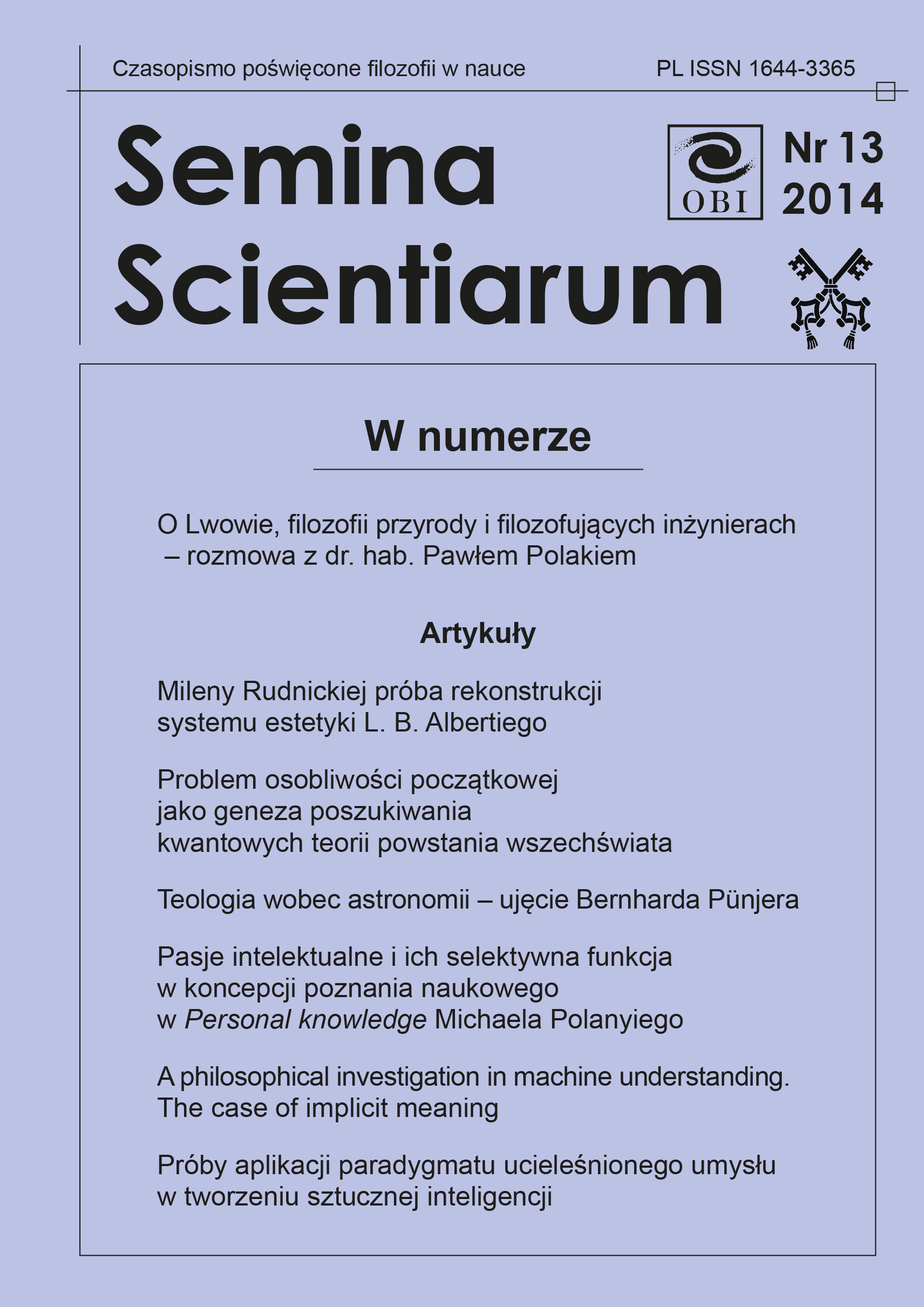Religia w perspektywie ewolucjonistycznej, ze szczególnym uwzględnieniem jej funkcji socjalizacyjnej
DOI:
https://doi.org/10.15633/ss.700Słowa kluczowe:
religion, evolution, sociobiology, memetics, cognitive sciencesAbstrakt
This paper gives an overview of the potential integrative function of religion from the evolutionary standpoint. In order to fulfill those aims, the work first addresses the characterization of the use of an evolutionary paradigm for the study of religion. In this section, the most prominent evolutionary hypotheses of religion are discussed: the sociobiological view, memetic approach and cognitive perspective. Subsequently, the article also introduces several conceptual difficulties of the whole program of Darwinian religious study. In the final part of the paper, a couple of the most important religious mechanisms of social integration are shown.
Bibliografia
Adlrich H. E. i in., In Defence of Generalized Darwinism, „Journal of Evolutionary Economics” 2008, Vol. 18, Issue 5, s. 577–596.
Anderson Thomson J., Aukofer C., Why We Believe in god(s). A Concise Guide to the Science of Faith, Charlottesville 2011.
Atran S., Norenzayan A., Religion’s evolutionary landscape: Counterintuition, commitment, compassion, communion, „Behavioral and Brain Sciences” 2004, Vol. 27, Issue 6, s. 713–770.
Atran S., Henrich J., The Evolution of Religion: How Cognitive By-Products, Adaptive Learning Heuristics, Ritual Displays, and Group Competition Generate Deep Commitments to Prosocial Religions, „Biological Theory” 2010, Vol. 5, Issue 1, s. 18–30.
Blackmore S., Maszyna memowa, Poznań 2002.
Blume M., God in the Brain How much can „Neurotheology” explain?, [w:] Zukunftsperspektiven im theologisch-naturwissenschaftlichen Dialog, Hg. P. Becker, U. Diewald, Getynga 2011, s. 306–314.
Brigandt I., Explanation in Biology: Reduction, Pluralism, and Explanatory Aims, „Science & Education” 2013, Vol. 22, s. 69–91.
Dawkins R., Viruses of the Mind, [w:] Dennett and His Critics: Demystifying Mind, ed. B. Dahlbom, Cambridge 1993, s. 13–27.
Dawkins R., Samolubny gen, Warszawa 1996.
Dawkins R., What Use is Religion, www.secularhumanism.org/library/fi/dawkins_24_5.htm (10.11.2012).
Dennett D., Odczarowanie. Religia jako zjawisko naturalne, Warszawa 2008.
Fetchenhauer D., Evolutionary Perspectives on Religion – What They Can and What They Cannot Explain (Yet), [w:] The Biological Evolution of Religious Mind and Behavior, eds. E. Voland, W. Schiefenhövel, Berlin 2009, s. 275–291.
Klawiter A., Teoria ewolucji a ewolucjonizm: od koncepcji biologicznej do mega paradygmatu myślowego, [w:] Teoria i metoda w biologii ewolucyjnej, red. K. Łastowski, Poznań 2004, s. 233–242.
Lahti D. C., The Correlated History of Social Organization, Morality, and Religion, [w:] The Biological Evolution of Religious Mind and Behavior, eds. E. Voland, W. Schiefenhövel, Berlin 2009, s. 67–88.
Martin L. H., Can Religion Really Evolve? (And what it is anyway?), [w:] The Evolution of Religion. Studies, Theories & Critiques, eds. J. Bulbulia, R. Sosis, E. Harris i in., Santa Margarita 2008, s. 349–355.
Miłkowski M., Poczobut R., Czym jest i jak istnieje umysł?, „Diametros” 2005, nr 3, s. 27–55.
Motak D., Religia w perspektywie antropologii kognitywnej, [w:] Religioznawstwo polskie w XXI wieku, red. Z. Stachowski, Tyczyn 2005, s. 839–845.
Nowaczyk M., Ewolucjonizm kulturowy a religia, Warszawa 1989.
Piątek Z., Pawi ogon. Czyli o biologicznych uwarunkowaniach kultury, Kraków 2007.
Purzycki B. G., Sosis R., The Religious System as Adaptive: Cognitive Flexibility, Public Displays, and Acceptance, [w:] The Biological Evolution of Religious Mind and Behavior, eds. E. Voland, W. Schiefenhövel, Berlin 2009, s. 243–256.
Ray W. J., Evolutionary Psychology: Neuroscience Perspectives concerning Human Behavior and Experience, London 2013.
Saler B., Essentialism and Evolution, [w:] The Evolution of Religion. Studies, Theories & Critiques, eds. J. Bulbulia, R. Sosis, E. Harris i in., Santa Margarita 2008, s. 379–386.
Sosis R., The Adaptive Value of Religious Ritual. Rituals Promote Group Cohesion by Requiring Members to Engage in Behavior that is too Costly to Fake, „American Scientist” 2004, Vol. 92, No. 2, s. 166–172.
Sztajer S., Religia w świetle nauk kognitywnych, „Przegląd Religioznawczy” 2007, nr 223 (1), s. 25–38.
Sztajer S., Naturalne podstawy religii w ujęciu religioznawstwa kognitywnego, „Przegląd Religioznawczy” 2008, nr 2 (228), s. 95–106.
Szyjewski A., Rozbite kubki po dekonstrukcji: współczesne antropologiczne teorie religii, „Studia Religiologica” 2007, t. 40, s. 135–169.
Wright R., Moralne zwierzę. Dlaczego jesteśmy tacy, a nie inni: psychologia ewolucyjna a życie codzienne, Warszawa 2004.
Wszołek S., Wprowadzenie do filozofii religii, Kraków 2004.
Zimbardo P., Efekt Lucyfera. Dlaczego dobrzy ludzie czynią zło?, Warszawa 2008.
Pobrania
Opublikowane
Numer
Dział
Licencja
Twórca oświadcza, że przysługują mu prawa autorskie do utworu i że nie są ograniczone w zakresie objętym niniejszym oświadczeniem oraz że utwór jest dziełem oryginalnym i nie narusza praw autorskich innych osób.
Twórca zezwala Uniwersytetowi Papieskiemu Jana Pawła II w Krakowie na nieodpłatne, niewyłączne i nieograniczone w czasie korzystanie z utworu, to jest:
- utrwalanie i zwielokrotnianie: wytwarzanie egzemplarzy utworu techniką drukarską, reprograficzną, zapisu magnetycznego oraz techniką cyfrową;
- obrotu oryginałem albo egzemplarzami, na których utwór utrwalono (wprowadzanie do obrotu, użyczenie lub najem oryginału albo egzemplarzy, publiczne wystawienie, wyświetlenie, a także publiczne udostępnianie utworu w taki sposób, aby każdy mógł mieć do niego dostęp w miejscu i w czasie przez siebie wybranym);
- włączenie utworu w skład utworu zbiorowego;
- udzielanie przez Uniwersytet Papieski Jana Pawła II w Krakowie sublicencji Creative Commons Uznanie autorstwa-Użycie niekomercyjne-Bez utworów zależnych 3.0 Polska
Uniwersytet Papieski Jana Pawła II w Krakowie udostępnia utwór na Platformie Czasopism należącej do uczelni, na licencji Creative Commons Uznanie autorstwa-Użycie niekomercyjne-Bez utworów zależnych 3.0 Polska. Tym samym uprawnia wszystkich zainteresowanych do korzystania z utworu pod następującymi warunkami:
- zostanie podany autor i tytuł utworu,
- zostanie podane miejsce publikacji (tytuł czasopisma i adres internetowy do oryginalnie opublikowanego utworu),
- utwór będzie dystrybuowany w sposób niekomercyjny,
- nie będą tworzone utwory zależne.

